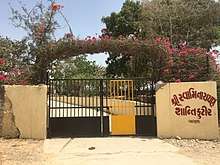Narayanprasaddasji Swami
Tapomurti Sadguru Shastri Swami Shri Narayanprasaddasji (born Girdhar Radadiya; ordained Shastri Swami Narayanprasaddasji, January 14, 1921 – January 30, 2018),[2][4] also known as Tapomurti Shastri Swami[2] and Guruji by his devotees, was one of the most noted Swami of the Swaminarayan Sampraday who has done a notable work for the Swaminarayan sect.[2][5] he is also considered as one of the legendary Hindu saints of India.[1]
Narayanprasaddasji Swami નારાયણપ્રસાદદાસજી સ્વામી | |
|---|---|
તપોમૂર્તિ સદ્દગુરુ શાસ્ત્રી સ્વામી શ્રી નારાયણપ્રસાદદાસજી | |
| Personal | |
| Born | Girdhar Premjibhai Radadiya (ગિરધર પ્રેમજીભાઈ રાદડીયા)[1] January 14, 1921 |
| Died | January 30, 2018 (age 97) [2] |
| Religion | Hinduism |
| Nationality | Indian |
| Sect | Swaminarayan Sampraday[2] |
| Known for | Tapas (તપોમૂર્તિ),[2] Sanskritacharya (સંસ્કૃતાચાર્ય),[3] Kathaas (કથા) [1] |
| Relatives | Premjibhai Radadiya (Father) Juthiben Radadiya (Mother) Nagjibhai Radadiya (Nephew) |
| Religious career | |
| Guru | Gopaljivandasji swami[2] |
Influenced
| |
| Literary works | Gyan Vilash (Sanskrit: ज्ञान विलास)[1] |
| Honors | Shastri (Scholar), |
| Part of a series on | |
| Hindu philosophy | |
|---|---|
 | |
| Orthodox | |
|
|
|
| Heterodox | |
|
|
|
|
|
|
Early life
Shastri Swami Narayanprasaddasji was born on 14 January 1921, the auspicious day of the Hindu Festival Makar Sankranti, in the Vaishnav - Patidar family of Saurashtra region in the Gujarat, India, and was named as Girdhar. His parents, Premjibhai (Father) and Juthiben (Mother) had 4 other children, Kesarben, Keshubhai, Madhubhai and Raliyatben, of which Girdhar was the youngest. Girdhar was from a very poor family, so he was not even able to finish his primary education. Since his childhood, He was very brilliant and had a natural inclination for spiritual learning and reading of religious scriptures. He used to go to sing Swaminarayan Kirtan with his childhood friends to the nearest Swaminarayan Temples. and during this, His art and singing came in the eyes of the saints of Swaminarayan. and therefore, to educate Girdhar and to serve the saints, Saints had taken the permission of girthar's family to bring girdhar with their self. and later saints have decided to make Girdhar a Saint, but girdhar's family was not agreed to it, so girdhar's elder brother Madhubhai brought girdhar back from the saints of Swaminarayan. being attracted by the pure and virtuous life led by the saints of Swaminarayan Sampraday, Girdhar left his home and renounced his family at the age of 12[1] to become a Saint of Swaminarayan Sampraday. His brothers, Keshubhai had died at the young age while Madhubhai had shifted to the village Thordi. Currently, From the entire family of Girdhar, Nagjibhai (Son of Madhubhai) and his family members are the only who are alive and living in Surat.
Religious Education
After joining Swaminarayan Sampraday, he finished his primary and Secondary education in Gujarat and then he had gone to Banaras Hindu University[1] for higher education where he passed Master of Arts- M.A in 6 different Religious Subjects in Sanskrit[2][1] and therefore people also used to call him as Sanskrutachary[3] which means a person who has a phenomenal knowledge of the language Sanskrit. Swami had also received Shastri degree from Banaras. During his entire education in Banaras/Kashi, he had studied with some of the greatest Hindu religious leaders, such as Pandurang Shastri Athavale[1] - Dada of Swadhyay Parivar, Dongreji Maharaj of Vaishnav Sampraday,[1] Swami Sachchidanandji (Dantali), Swami Satyamitranand (Former Shankaracharya). He also had written a Book in Sanskrit named Gyan Vilas.[1]
Kathaas, Tapas and Fasting
Swami Narayanprasaddasji had conducted over 100 Kathaas[1] in the Gujarat, Hindi and Sanskrit, most of them were based on the Bhagavata Purana, Bhaktachintamani of Nishkulanand Swami and Vachanamrut. During his whole life, Swami was mostly known for his Tapas (Sanskrit: तप) as he had started doing a deep Tapas[6] for the last 30 years of his life at his resident Shanti Kutir[1] located at the Arambhada[2][7] village on the coast near Dwarka and therefore, he was known as Tapomurti.[5] transl. Ascetic). Swamiji used to drink only one litre of Milk per day[1] and sometimes, he used to drink Coconut water as a food because he had abandoned the normal food and had not even eaten the single piece of Grain[7] or any item made of any kind of Grains since the last 55 years of his life.[2][3][6][1]
Kirtan
Swamiji was very fond of learning and singing Kirtan from childhood and it was said that Swami remembered more than 1000 kirtan. due to the Swami's voice was good, Dev Utsav Mandal (a Band) of Rajkot who are the devotees of Swami had recorded a Kirtan in the voice of Swami which was released after Swami's death.
Award
Shastri Swami Shri Narayanprasaddasji had received Award from the Second President of India Dr. Sarvepalli Radhakrishnan[1] for his Education and Knowledge towards the language Sanskrit.
Death
He had been suffering from a Prostatitis in his last days. Due to this, he had been shifted from Shanti Kutir, Arambhada to Swaminarayan Gurukul (Naghedi, Jamnagar) in the care of other Saints, where his surgery was performed. but unfortunately, he died at around 12 pm on 30 January 2018 at the Age of 97 at Swaminarayan Gurukul (Naghedi, Jamnagar).[2][8] The funeral of Swami had taken place as per Vedic Tradition on 31 January 2018[5] in the presence of the large numbers of Swaminarayan Saints and devotees of Swaminarayan Sampraday.[5][9][6]
Media Coverage
After Swami's Death, the Official confirmation of the death of Swami was made by the Saints of Jamnagar Swaminarayan Gurukul and Some of the big Gujarati Newspapers and Online News Portals like Divya Bhaskar (Online News portal)[2][5] & Newspaper,[8][9] Nobat Newspaper,[3] Sandesh Newspaper[4] , AajKaal Newspaper,[10] akilanews.com (Online News Portal)[6][7] and patelsamaj.co.in (Online News portal)[1] have published the articles of Swami's Life and Death.
References
- "07-02-2018 (patelsamaj.co.in) - Gujarati News Portal on death of Shastri Swami Narayanprasaddasji". patelsamaj.co.in (Online News Portal).
- "30-01-2018 (divyabhaskar.co.in) - Gujarati News Portal on Shastri Swami Narayanprasaddasji". Divya Bhaskar (Online News Portal).
- "31-01-2018 (Nobat Newspaper) - Newspaper article on death of Shastri Swami Narayanprasaddasji". Nobat (Newspaper).
- "31-01-2018 (Sandesh Newspaper) - Newspaper article on death of Shastri Swami Narayanprasaddasji". Sandesh (Newspaper).
- "01-02-2018 (divyabhaskar.co.in) - Gujarati News Portal on Shastri Swami Narayanprasaddasji". Divya Bhaskar (Online News Portal).
- "05-02-2018 (Akila News) - Gujarati News Portal on death of Shastri Swami Narayanprasaddasji". Akila News (Online News Portal).
- "05-02-2018 (Akila News) - 2nd Article, Gujarati News Portal on death of Shastri Swami Narayanprasaddasji". Akila News (Online News Portal).
- "31-01-2018 (Divya Bhaskar Newspaper) - Newspaper article on death of Shastri Swami Narayanprasaddasji". Divya Bhaskar (Newspaper).
- "01-02-2018 (Divya Bhaskar Newspaper) - Newspaper article on death of Shastri Swami Narayanprasaddasji". Divya Bhaskar (Newspaper).
- "31-01-2018 (Aajkaal Newspaper) - Newspaper article on death of Shastri Swami Narayanprasaddasji". Aajkaal (Newspaper).


